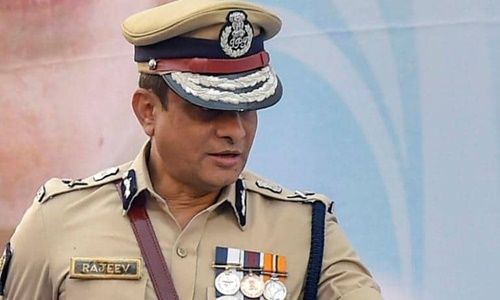New Delhi: The Supreme Court Friday dismissed a plea of former Kolkata police commissioner Rajeev Kumar seeking extension of protection from arrest in the multi-crore Saradha chit fund scam case.
Kumar was earlier granted protection from arrest by the apex court for seven days which ends Friday.
A vacation bench headed by Justice Arun Mishra said Kumar can approach the Calcutta High Court or the trial court there for seeking relief.
At the outset, the bench told Kumar’s counsel that a bench headed by Chief Justice Ranjan Gogoi had already passed an order in the matter and later the CJI had also declined urgent listing of an application filed by the IPS officer seeking extension of protection from arrest.
“Is it maintainable (the writ petition)? You can go to the high court or the trial court as the courts are functional there,” the bench told advocate Sunil Fernandes, who was representing Kumar.
When Fernandes said the courts in Kolkata are not functioning due to ongoing lawyers’ strike, the bench said, “You are wrong. The courts are sitting there. All judges are sitting in courts and they are hearing litigants. You client is a former commissioner of police and he knows the law better than many young lawyers. He can personally go to courts there.
The bench also said that Kumar’s fresh writ petition has wrongly been listed before it since the CJI-led bench had already passed an order in the matter.
Fernandes told the bench that they will approach the CJI but the problem was that protection from arrest granted to Kumar is expiring Friday.
“What can be done? Do we have the jurisdiction to hear this? Your problem may be anything but your petition under Article 32 is not maintainable,” the bench said.
“You have already moved an application for extension of protection before the CJI. Do you want harsh comment from us? It is not proper for you to file the petition and then request for urgent listing when the CJI had already declined urgent listing of your applications. Don’t misuse our generosity like this,” the bench said.
On May 17, a three-judge bench headed by CJI Ranjan Gogoi had withdrawn the protection from arrest granted to Kumar by its February 5 order.
However, the court had said his protection would continue for seven days from May 17 to enable him to approach the competent court for relief.
On May 20, Kumar had moved the apex court seeking an extension of the seven-day protection granted in view of lawyers’ strike in Kolkata.
However, the court had said since the May 17 order was passed by a three-judge bench, Kumar’s counsel can approach the apex court registry or the secretary general for listing of the matter before an appropriate bench.
In its May 17 order, the top court had also expressed concern over the confrontation between the CBI and the West Bengal Police in the case, saying “at the receiving end are silently waiting lakhs of small town and rural investors who have been deprived and looted of their savings”.
The bench had said the situation was grim as both sides have hardened their stand and there was no administrative mechanism in place to avoid and resolve such conflicts between two wings of the police force in the country.
It had noted that the CBI had issued three notices on October 18 and October 23, 2017, and on December 8, 2018, asking Kumar to appear and join investigation, but he had not responded.
The court had also noted that the West Bengal government and Kumar have alleged “political vendetta” and have made allegations against M Nageswara Rao, a former interim CBI director.
In its order, the court had said the CBI had alleged non-cooperation and charged the West Bengal Police with “obfuscating investigation by causing impediments and roadblocks with a view to protect big names and members/leaders of the ruling party in the State of West Bengal”.
The court had noted the CBI’s claim of having substantial material implicating Kumar, the then Commissioner, Bidhannagar Commissionerate, of connivance and complicity with the principal accused.
Earlier, Kumar in an affidavit before the court had alleged that he was targeted by the CBI in the chit fund case due to “mala fide intent” and “conflict of interest” of Rao as his family members were under the scanner post-demonetisation.
PTI
